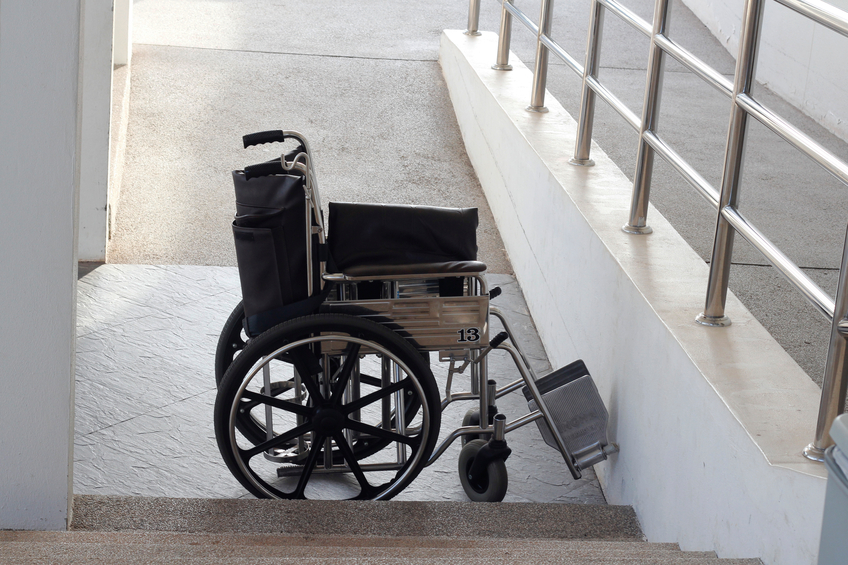Louisiana Electrical, ADA and Ethics 15 PDH Discount Package 1
Electrical Distribution Systems (E02-004)
Plumbing Guidelines for ADA Accessibility (M02-056)
Accessible Routes for ADA Accessibility (A02-012)
Engineering Ethics for Louisiana Professional Engineers (LA1-002)

This online engineering PDH course introduces the basic concepts of alternating current (AC) electrical circuits and discusses the associated terminology. It describes inductance and capacitance and their effects on AC circuits. It presents power calculations for single-phase and three-phase AC circuits and includes the power triangle concept.
Furthermore, it describes the operating characteristics of AC generators and includes terminology, methods of voltage production, and methods of paralleling AC generation sources. This course also explains the basic operation and application of voltage regulators. Finally, it explains the theory of operation of AC motors and discusses the various types of AC motors and their application.
This 8 PDH online course is applicable to electrical and computer engineers, design and construction personnel, technical staff and facility operators who are interested in gaining a better understanding of AC systems.
This PE continuing education course is intended to provide you with the following specific knowledge and skills:
- Understanding AC generation and analysis
- Learning inductance, capacitance, impedance and resonance
- Understanding the power triangle
- Knowing three-phase circuits
- Understanding AC generator components, theory and operation
- Identifying and learning the different components of a voltage regulator
- Understanding AC motors and different their types
- Understanding the transformers and their different types
In this professional engineering CEU course, you need to review Modules 7 to 13 of the Department of Energy Publication DOE-HDBK-1011/2-92, "Electrical Science" publication.
Upon successful completion of the quiz, print your Certificate of Completion instantly. (Note: if you are paying by check or money order, you will be able to print it after we receive your payment.) For your convenience, we will also email it to you. Please note that you can log in to your account at any time to access and print your Certificate of Completion.

This online engineering PDH course describes basic electrical distribution systems including system components and protection devices. It also presents the characteristics of system design, such as circuit breakers, motor controllers, wiring schemes and grounding, to ensure personnel and equipment safety.
This 2 PDH online course is applicable to electrical and computer engineers, design and construction personnel, technical staff and facility operators who are interested in gaining a better understanding of electrical distribution systems.
This PE continuing education course is intended to provide you with the following specific knowledge and skills:
- Understanding of system components and protection devices
- Learning about circuit breakers and motor controllers
- Understanding wiring schemes and grounding
In this professional engineering CEU course, you need to review Module 15, "Electrical Distribution Systems" of the Department of Energy Publication DOE-HDBK-1011/2-92, "Electrical Science".
Upon successful completion of the quiz, print your Certificate of Completion instantly. (Note: if you are paying by check or money order, you will be able to print it after we receive your payment.) For your convenience, we will also email it to you. Please note that you can log in to your account at any time to access and print your Certificate of Completion.

This online engineering PDH course focuses on the plumbing elements and facilities of the 2010 ADA standards for accessible design.
The Department of Justice published revised regulations for Titles II and III of the Americans with Disabilities Act of 1990 "ADA" in the Federal Register on September 15, 2010. These regulations adopted revised, enforceable accessibility standards called the 2010 ADA Standards for Accessible Design "2010 Standards" or "Standards". The 2010 Standards set minimum requirements – both scoping and technical – for newly designed and constructed or altered State and local government facilities, public accommodations, and commercial facilities to be readily accessible to and usable by individuals with disabilities.
This 2 PDH online course is applicable to mechanical and civil engineers, architects, construction managers and others interested in learning more about plumbing guidelines for ADA accessibility.
This PE continuing education course is intended to provide you with the following specific knowledge and skills:
- Learning about the drinking fountain ADA requirements
- Learning about the coat hooks and shelves ADA requirements
- Learning about the water closet ADA requirements
- Learning about the urinal ADA requirements
- Learning about the shower stall ADA requirements
- Learning about the washing machine and dryers ADA requirements
- Learning about the saunas and steam rooms ADA requirements
In this professional engineering CEU course, you need to review “Plumbing Guidelines for ADA Accessibility”, which is based on Chapter 6 “Plumbing Elements and Facilities” of the 2010 ADA standards for accessible design.
Upon successful completion of the quiz, print your Certificate of Completion instantly. (Note: if you are paying by check or money order, you will be able to print it after we receive your payment.) For your convenience, we will also email it to you. Please note that you can log in to your account at any time to access and print your Certificate of Completion.

This online engineering PDH course focuses on the Accessible Routes of the 2010 ADA standards for accessible design.
The Department of Justice published revised regulations for Titles II and III of the Americans with Disabilities Act of 1990 "ADA" in the Federal Register on September 15, 2010. These regulations adopted revised, enforceable accessibility standards called the 2010 ADA Standards for Accessible Design "2010 Standards" or "Standards". The 2010 Standards set minimum requirements – both scoping and technical – for newly designed and constructed or altered State and local government facilities, public accommodations, and commercial facilities to be readily accessible to and usable by individuals with disabilities.
This 2 PDH online course is applicable to all engineers, architects, construction managers and others interested in learning more about accessible routes for ADA accessibility.
This PE continuing education course is intended to provide you with the following specific knowledge and skills:
- Learning about the ADA requirements of accessible routes for walking surfaces
- Learning about the ADA requirements of accessible routes for doors, doorways and gates
- Learning about the ADA requirements of accessible routes for ramps and curb ramps
- Learning about the ADA requirements of accessible routes for elevators and elevator car
- Learning about the ADA requirements of accessible routes for platform lifts
Upon successful completion of the quiz, print your Certificate of Completion instantly. (Note: if you are paying by check or money order, you will be able to print it after we receive your payment.) For your convenience, we will also email it to you. Please note that you can log in to your account at any time to access and print your Certificate of Completion.

This online engineering PDH course presents the laws and rules of ethics and professional responsibility governing the practice of engineering in the State of Louisiana. Excerpts from Title 37, Chapter 8 of the Louisiana Revised Statutes and Title 46, Part LXI of the Louisiana Administrative Code, which relate to the laws and rules of professional conduct are presented in this course.
Engineering ethics is (1) the study of moral issues and decisions confronting individuals and organizations involved in engineering and (2) the study of related questions about moral conduct, character, ideals and relationships of peoples and organizations involved in technological development (Martin and Schinzinger, Ethics in Engineering).
Since engineers are faced with frequent moral and ethical dilemmas while practicing their engineering profession, this course will provide you with moral and ethical guidance in your decision making process. Most importantly, it will provide you with insight on how to conduct, respect and protect your engineering practice with the utmost professionalism.
This 1 PDH online course is applicable to Professional Engineers licensed in the State of Louisiana and who are required to demonstrate continuing professional competency in engineering ethics as a condition of their license renewal. For each renewal period, every licensee must complete fifteen (15) professional development hours, at least one (1) of which must be relative to professional responsibility, conduct and ethics.
This PE continuing education engineering course is intended to provide you with the following specific knowledge and skills:
- Familiarizing with the laws and rules regulating the practice of engineering in the State of Louisiana
- Understanding the roles of the Louisiana Board and its disciplinary authority
- Understanding the Louisiana Board disciplinary process
- Learning about engineering ethics and the laws and rules of professional conduct and responsibility
- Reviewing ethical and disciplinary case studies and their corresponding penalties
Upon successful completion of the quiz, print your Certificate of Completion instantly. (Note: if you are paying by check or money order, you will be able to print it after we receive your payment.) For your convenience, we will also email it to you. Please note that you can log in to your account at any time to access and print your Certificate of Completion.